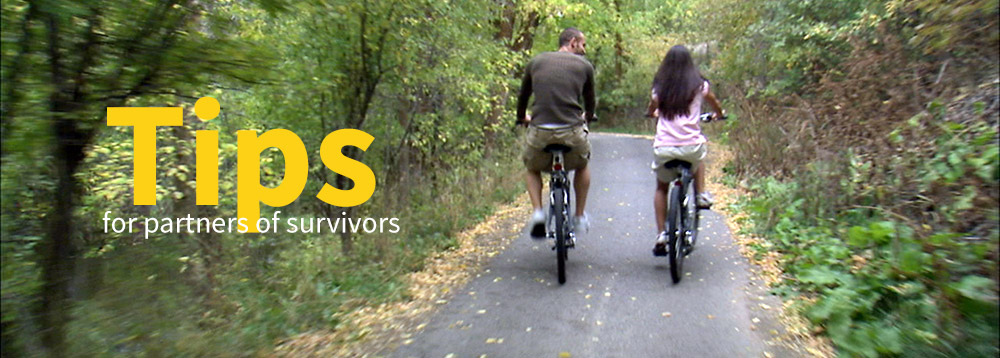
By
When you are in a relationship with someone who has been harmed, it is difficult to know how to help your partner while also managing your own reactions. Some of the reactions you may have are:
- Anger
- Sleep disturbances
- Guilt or shame
- Fearfulness
- Denial
- Frustration
- Depression
- Wanting to take action
Because of these reactions, it is sometimes helpful for you to seek support for yourself, in addition to your partner seeking help to recover from the violence. All of these reactions are normal responses to trauma - even when you did not experience a traumatic event directly yourself. Managing these reactions in a healthy way is key to being able to support your partner.
Every relationship is different and how you communicate with your partner is unique to the two of you. For that reason these are general guidelines that we suggest.
- Be aware of your own reactions. You want to be able to speak to your partner in a calm and supportive way. If you are angry or frustrated, take time to help yourself first before trying to help your partner. He or she can pick up on non-verbal reactions so don’t try to “hide” your feelings. You have a right to these reactions and they can be dealt with in a positive way.
- Ask only those questions that are needed to assess safety or medical issues. Probing questions are not helpful. The best question you can ask your partner is, “What do you need from me?” And then do what is asked of you.
- Do not push your partner to do something he or she does not want to do, such as call the police or confront their perpetrator. It is important for your partner to feel that they are back in control of their life as soon as possible. Trauma takes away choices and personal power, so you want to be mindful of this as you try to be helpful.
- Allow your partner to have whatever feelings and reactions occur, including allowing them to define what happened to them. They are the only person who can since they were there. It may be hard to hear some of the things your partner says. Again this would be a reason for you to talk to someone else for support. For example, some victims feel they are to blame for their assault. You can assure your partner that you do not blame them but do not try to argue them out of their own feelings. They need to work through this in their own way.
- Respect your partner’s boundaries and privacy. If he or she asks to be alone, do not push to be with them or constantly text or call, unless there is a safety issue. It is important to let your partner establish boundaries as part of gaining that sense of control and personal safety.
- As part of respecting boundaries and privacy, do not tell friends and family members what has happened unless you have your partner’s permission. Be careful about what you post or communicate about your partner via social media. An email or text can be forwarded to anyone.
- It is also important to communicate about what types of touch your partner is comfortable with and remember that this can change. Do not take it personally if your partner does not want your touch at times.
- Listen, listen, listen and believe them. Unfortunately, you cannot change what has happened or “fix” your partner. You CAN be a very important part of the healing process.

